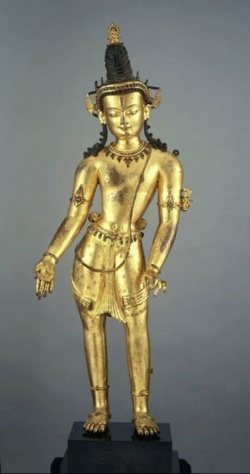Difference between revisions of "State support for monasteries"
| Line 4: | Line 4: | ||
The relationship between government and [[religion]] in [[China]] was in a [[constant]] state of flux during the {{Wiki|Song dynasty}}. The new laws enacted by [[Wang An-shih]] from 1065-85 marked one of these many changes. During this reformist {{Wiki|era}}, state support for [[Monasteries]] declined. Only some [[monasteries]] were "official" and state [[ordained]]. The government gave certificates to those [[monasteries]] which it chose to support. These marks of state [[recognition]], though many times small, were kept at the entrance of the [[monastery]] and were valued greatly by the resident [[monks]]. | The relationship between government and [[religion]] in [[China]] was in a [[constant]] state of flux during the {{Wiki|Song dynasty}}. The new laws enacted by [[Wang An-shih]] from 1065-85 marked one of these many changes. During this reformist {{Wiki|era}}, state support for [[Monasteries]] declined. Only some [[monasteries]] were "official" and state [[ordained]]. The government gave certificates to those [[monasteries]] which it chose to support. These marks of state [[recognition]], though many times small, were kept at the entrance of the [[monastery]] and were valued greatly by the resident [[monks]]. | ||
| − | Support for [[Buddhism]] waxed and waned for a variety of [[reasons]]. During the reign of [[emperor]] [[Huizong]] (r. 1100-1126), funding for [[Buddhism]] not only dried up, but [[Huizong]] passed laws designed to suppress [[Buddhism]]. Instead of supporting [[Buddhism]], [[Huizong]] supported [[Daoist]] [[temples]], as he himself was a serious [[Daoist]]. Though [[belief]] in {{Wiki|Daoism}} does not exclude an {{Wiki|individual}} from [[belief]] in [[Buddhism in China]] (unlike, in the '[[West]]' for example, where [[belief]] in [[Christianity]] excludes [[belief]] in {{Wiki|Islam}} and visa versa), [[Huizong]] clearly favored {{Wiki|Daoism}} and made this part of his official policy. Other [[reasons]] for cutting state support to [[Buddhist]] [[Monasteries]] included funding for warfare and a | + | Support for [[Buddhism]] waxed and waned for a variety of [[reasons]]. During the reign of [[emperor]] [[Huizong]] (r. 1100-1126), funding for [[Buddhism]] not only dried up, but [[Huizong]] passed laws designed to suppress [[Buddhism]]. Instead of supporting [[Buddhism]], [[Huizong]] supported [[Daoist]] [[temples]], as he himself was a serious [[Daoist]]. Though [[belief]] in {{Wiki|Daoism}} does not exclude an {{Wiki|individual}} from [[belief]] in [[Buddhism in China]] (unlike, in the '[[West]]' for example, where [[belief]] in [[Christianity]] excludes [[belief]] in {{Wiki|Islam}} and visa versa), [[Huizong]] clearly favored {{Wiki|Daoism}} and made this part of his official policy. Other [[reasons]] for cutting state support to [[Buddhist]] [[Monasteries]] included funding for warfare and a general lack of [[money]]. Finally, I want to note that state support for [[monasteries]] declined generally, starting with [[Huizong]] and continuing through the Southern Song. This does not mean that [[Buddhism]] declined during these times, but the {{Wiki|decline}} of state support was due to a general {{Wiki|decline}} in government power and influence in the daily [[lives]] of the [[people]] under their rule. |
{{R}} | {{R}} | ||
[http://academic.reed.edu/chinese/chin-hum/claypools09/Hum%20230%20Project/Monasteries1065.html academic.reed.edu] | [http://academic.reed.edu/chinese/chin-hum/claypools09/Hum%20230%20Project/Monasteries1065.html academic.reed.edu] | ||
[[Category:Chinese Buddhist History]] | [[Category:Chinese Buddhist History]] | ||
Latest revision as of 16:23, 20 March 2014
By: Mark Chapman
The relationship between government and religion in China was in a constant state of flux during the Song dynasty. The new laws enacted by Wang An-shih from 1065-85 marked one of these many changes. During this reformist era, state support for Monasteries declined. Only some monasteries were "official" and state ordained. The government gave certificates to those monasteries which it chose to support. These marks of state recognition, though many times small, were kept at the entrance of the monastery and were valued greatly by the resident monks.
Support for Buddhism waxed and waned for a variety of reasons. During the reign of emperor Huizong (r. 1100-1126), funding for Buddhism not only dried up, but Huizong passed laws designed to suppress Buddhism. Instead of supporting Buddhism, Huizong supported Daoist temples, as he himself was a serious Daoist. Though belief in Daoism does not exclude an individual from belief in Buddhism in China (unlike, in the 'West' for example, where belief in Christianity excludes belief in Islam and visa versa), Huizong clearly favored Daoism and made this part of his official policy. Other reasons for cutting state support to Buddhist Monasteries included funding for warfare and a general lack of money. Finally, I want to note that state support for monasteries declined generally, starting with Huizong and continuing through the Southern Song. This does not mean that Buddhism declined during these times, but the decline of state support was due to a general decline in government power and influence in the daily lives of the people under their rule.
